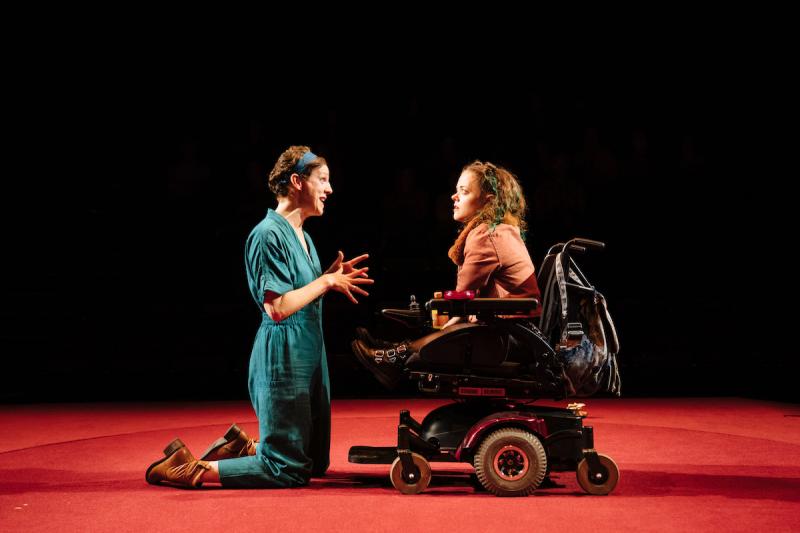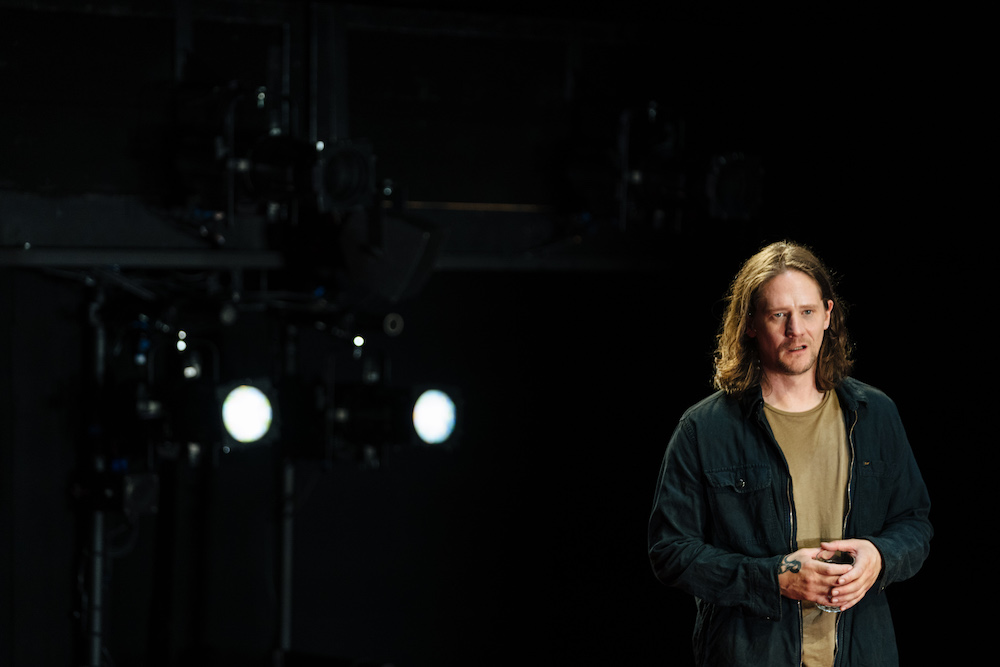All of Us, National Theatre review - revelatory, but problematic | reviews, news & interviews
All of Us, National Theatre review - revelatory, but problematic
All of Us, National Theatre review - revelatory, but problematic
Francesca Martinez’s debut play about disability politics entertains - and frustrates

Has the pandemic made us more angry? Although Francesca Martinez’s debut play, which is at the National Theatre, was programmed before COVID, its belated opening has not dampened the playwright’s fiery criticism of the effects of Tory government austerity on the lives of people with disabilities.
As you’d expect from the writer – who is an award-winning comedian, actor, author of What the **** Is Normal? and has cerebral palsy (though she prefers the word “wobbly”) – All of Us is written in a deeply committed and compassionate way, but although I agree with its political points, and am moved by some of its scenes, I also think that it’s not entirely problem-free.
The play begins with a beautiful reversal of expectations. Two women arrive at a therapy room: Jess (Martinez) is a thirtysomething with cerebral palsy and Rita is in her fifties. You might assume that Jess is the patient and Rita the therapist, but actually it’s the other way around. The story then shows how government changes to the benefits system, basically cuts, make it increasingly difficult for Jess to do her job. But first, the people in Jess’s world are introduced: her pregnant lesbian flatmate Lottie, her harassed Polish carer Nadia, and another of her patients, Aidan, a young man with a drink problem. And a dad problem.
But the real injection of energy comes with the arrival of Poppy, a northern 20-year-old who dresses like a punk and uses an electric wheelchair. Despite having restricted growth and being in constant pain, her motto is “live fast, die young”, and boy does this charismatic scene-stealing character light up the stage with her humour, her anger and her fearlessness. She also challenges the idea that people with disabilities are victims. Okay, she needs help with changing, washing and dressing, but she also wants to get stoned, listen to rock music and have sex. One gloriously tender and funny scene shows her with a Tinder hookup, another sees her being undressed for bed by her friends. All of Us has a clear agenda. It is a protest against Tory cuts to disability payments, but also a statement about people with special needs. They are not, argues Martinez, abnormal “others”, but – as her title suggests – just like the rest of us. Although many people see them as society’s “most vulnerable”, they are the same – they simply need financial and material help to do some of the things the rest of us take for granted. And, as I know from my mother’s experiences in recent years, anyone can end up being in need of social care, and we are all potentially dependent on state support – at any age. Shrinking the state simply means making more and more people miserable.
All of Us has a clear agenda. It is a protest against Tory cuts to disability payments, but also a statement about people with special needs. They are not, argues Martinez, abnormal “others”, but – as her title suggests – just like the rest of us. Although many people see them as society’s “most vulnerable”, they are the same – they simply need financial and material help to do some of the things the rest of us take for granted. And, as I know from my mother’s experiences in recent years, anyone can end up being in need of social care, and we are all potentially dependent on state support – at any age. Shrinking the state simply means making more and more people miserable.
But Jess and Poppy are not the same: while Poppy has no problem articulating her anger, and is a Tory voter resentful of being perceived as stupid by people with a university education (aka the metro elite), Jess is very buttoned up. Although it’s her job to advise her patients to talk about their feelings, it is precisely that which she finds so hard to do herself. Since she cannot completely control her erratic physical movements, she wants to control her emotions. At one point, her friendship with Lottie comes under stress because she is unable to openly confide in the other woman. At another, by contrast, Jess, Poppy and Lottie bond hilariously over the different words they use for their vaginas. The keynote of the play is emotional complexity and conflicted humanity. And humour.
However, in the second half, the focus begins to blur. Already, Martinez has included unnecessary portraits of disability assessors and doctors, who treat Jess in a patronising and ignorant way, and now she opens out the play into the overtly political sphere by introducing Hargreaves, a local Tory MP. While the public meeting that he holds allows this panoramic drama to include more than 15 cast members, it also slows down the story. The personal becomes overtly political, and while I agree that the Tories are deliberately immiserating people with disabilities, there is no need to say so, over and over again.
By the end, elements of melodrama and sentimentality begin to clog up the storytelling. But the worst aspect of a three-hour evening is Martinez’s desire to be fair to everyone, which is quite humane, but also problematic. I completely understand that Tory politicians are bad people because they were fucked up by their parents, but blaming their mums and dads for their cruel policies simply lets them off the hook. Although Martinez is passionately opposed to disabled people being patronised, she herself patronises Tories by absolving them of responsibility for their actions. Evil policies? Bad ideology? Not their fault!
Still, director Ian Rickson’s enthralling production (designed by Georgia Lowe) is a gift to Martinez’s vision, creating several scenes which are both funny and immensely moving, and showing an ample view of British society, on a stage where few actors with disabilities ever get the chance to perform. The large cast is excellent, led by Martinez’s glowingly sympathetic Jess and Francesca Mills’s feisty taboo-busting Poppy, and well supported by Bryan Dick’s Aiden (pictured above) and Crystal Condie’s Lottie. If the plotting is predictable, and the story arc unremarkable, the image of life represented is both strongly compassionate and often very pleasurable. In true welfare state style, All of Us not only informs and educates, but also entertains.
rating
Explore topics
Share this article
The future of Arts Journalism
You can stop theartsdesk.com closing!
We urgently need financing to survive. Our fundraising drive has thus far raised £49,000 but we need to reach £100,000 or we will be forced to close. Please contribute here: https://gofund.me/c3f6033d
And if you can forward this information to anyone who might assist, we’d be grateful.

Subscribe to theartsdesk.com
Thank you for continuing to read our work on theartsdesk.com. For unlimited access to every article in its entirety, including our archive of more than 15,000 pieces, we're asking for £5 per month or £40 per year. We feel it's a very good deal, and hope you do too.
To take a subscription now simply click here.
And if you're looking for that extra gift for a friend or family member, why not treat them to a theartsdesk.com gift subscription?
more Theatre
 Little Brother, Soho Theatre review - light, bright but emotionally true
This Verity Bargate Award-winning dramedy is entertaining as well as thought provoking
Little Brother, Soho Theatre review - light, bright but emotionally true
This Verity Bargate Award-winning dramedy is entertaining as well as thought provoking
 The Unbelievers, Royal Court Theatre - grimly compelling, powerfully performed
Nick Payne's new play is amongst his best
The Unbelievers, Royal Court Theatre - grimly compelling, powerfully performed
Nick Payne's new play is amongst his best
 The Maids, Donmar Warehouse review - vibrant cast lost in a spectacular-looking fever dream
Kip Williams revises Genet, with little gained in the update except eye-popping visuals
The Maids, Donmar Warehouse review - vibrant cast lost in a spectacular-looking fever dream
Kip Williams revises Genet, with little gained in the update except eye-popping visuals
 Ragdoll, Jermyn Street Theatre review - compelling and emotionally truthful
Katherine Moar returns with a Patty Hearst-inspired follow up to her debut hit 'Farm Hall'
Ragdoll, Jermyn Street Theatre review - compelling and emotionally truthful
Katherine Moar returns with a Patty Hearst-inspired follow up to her debut hit 'Farm Hall'
 Troilus and Cressida, Globe Theatre review - a 'problem play' with added problems
Raucous and carnivalesque, but also ugly and incomprehensible
Troilus and Cressida, Globe Theatre review - a 'problem play' with added problems
Raucous and carnivalesque, but also ugly and incomprehensible
 Clarkston, Trafalgar Theatre review - two lads on a road to nowhere
Netflix star, Joe Locke, is the selling point of a production that needs one
Clarkston, Trafalgar Theatre review - two lads on a road to nowhere
Netflix star, Joe Locke, is the selling point of a production that needs one
 Ghost Stories, Peacock Theatre review - spirited staging but short on scares
Impressive spectacle saves an ageing show in an unsuitable venue
Ghost Stories, Peacock Theatre review - spirited staging but short on scares
Impressive spectacle saves an ageing show in an unsuitable venue
 Hamlet, National Theatre review - turning tragedy to comedy is no joke
Hiran Abeyeskera’s childlike prince falls flat in a mixed production
Hamlet, National Theatre review - turning tragedy to comedy is no joke
Hiran Abeyeskera’s childlike prince falls flat in a mixed production
 Rohtko, Barbican review - postmodern meditation on fake and authentic art is less than the sum of its parts
Łukasz Twarkowski's production dazzles without illuminating
Rohtko, Barbican review - postmodern meditation on fake and authentic art is less than the sum of its parts
Łukasz Twarkowski's production dazzles without illuminating
 Lee, Park Theatre review - Lee Krasner looks back on her life as an artist
Informative and interesting, the play's format limits its potential
Lee, Park Theatre review - Lee Krasner looks back on her life as an artist
Informative and interesting, the play's format limits its potential
 Measure for Measure, RSC, Stratford review - 'problem play' has no problem with relevance
Shakespeare, in this adaptation, is at his most perceptive
Measure for Measure, RSC, Stratford review - 'problem play' has no problem with relevance
Shakespeare, in this adaptation, is at his most perceptive
 The Importance of Being Earnest, Noël Coward Theatre review - dazzling and delightful queer fest
West End transfer of National Theatre hit stars Stephen Fry and Olly Alexander
The Importance of Being Earnest, Noël Coward Theatre review - dazzling and delightful queer fest
West End transfer of National Theatre hit stars Stephen Fry and Olly Alexander

Add comment